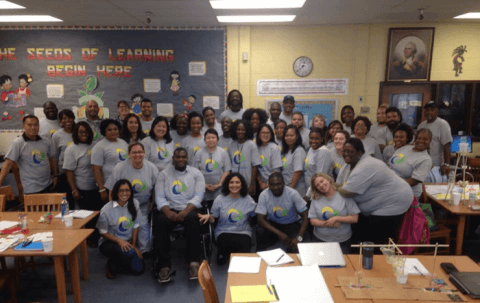Dr. Deena Khalil Set to Close Out a 4-Year Engineering Design Project with Prince George's County

Over the past four years, Dr. Deena Khalil, associate professor of mathematics education, in partnership with a colleague from the College of William and Mary, Dr. Meredith Kier, have led a major teacher professional development project known as E-Communities.
E-Communities, funded by the National Science Foundation, paired the expertise of professional engineers and STEM educators to increase the ability of mathematics and science teachers to engage students in the engineering design process. Participants collaborated across social network platforms with engineers and STEM educators from diverse careers and ethnic backgrounds to support student engagement in the engineering design process.
As Principal Investigator, Khalil reflected on her team’s efforts to better understand and promote practices that increase students' motivations and capacities to pursue careers in science, technology, engineering, or mathematics (STEM). She asserts that a great challenge for teachers is to find ways to “rehumanize mathematics by meaningfully connecting a STEM professional’s story and cultural capital to students’ lived experiences.”
During the past couple of years, Khalil noticed that E-Communities has become more sustainable. Teachers became more comfortable with the engineering design process and began creating their own designs to solve problems. Teachers also became aware of inexpensive, readily available materials they can use in the design process. Khalil noted that high-tech kits are not always necessary, but teachers “can tinker with simple things like dialysis tubing and syringes.”
For Khalil, she noted that it was gratifying to see the enthusiasm from teachers who participated in the project. She knows that E-Communities would not have been successful without the teachers, volunteer engineers, and other partners. Major contributors such as Paige Teamey, an independent engineering educator and curriculum developer, as well as former Fellow, Dr. Joanna Sanchez, helped to make the project a success, further reiterating the importance of “community” in STEM education.
Research from the E-communities project shows that HBCU partnerships with K-12 schools can help disrupt inequities by designing opportunities for teachers, students, and community members to co-construct learning spaces.
The project team is especially excited to share their lessons learned in the upcoming Handbook for Teachers of Color. Dr. Khalil and the E-communities team have presented their findings more than a dozen times at national and international conferences such as the American Educational Research Association and International Conference for the Association for Science Teacher Education. Their work has also been shared in several peer-reviewed outlets and books such as Power, Equity, and Re:Design: Bridging Learning and Critical Theories in Learning Ecologies for Youth.
